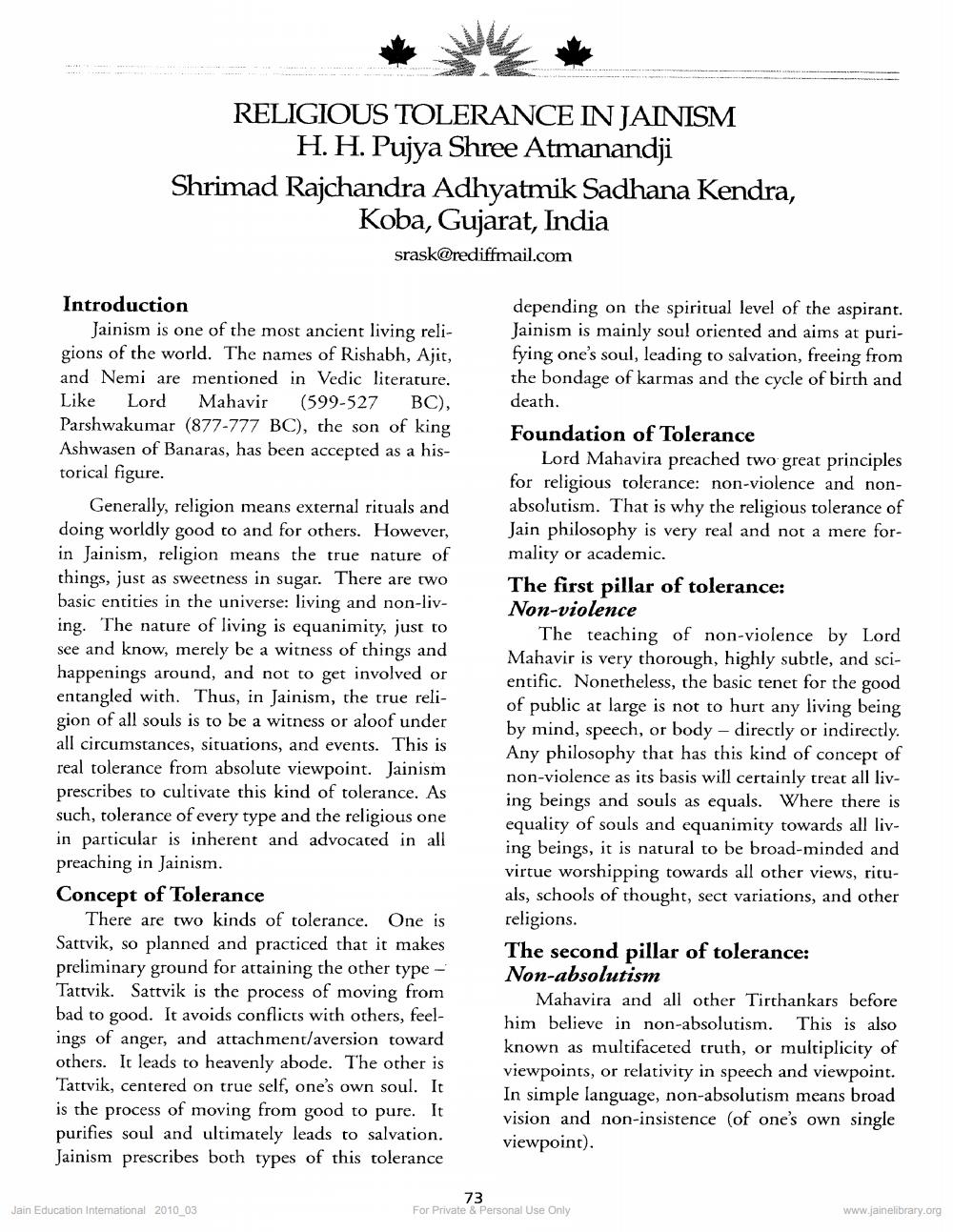________________
RELIGIOUS TOLERANCE IN JAINISM
H. H. Pujya Shree Atmanandji Shrimad Rajchandra Adhyatmik Sadhana Kendra,
Koba, Gujarat, India
[email protected]
Introduction
Jainism is one of the most ancient living religions of the world. The names of Rishabh, Ajit, and Nemi are mentioned in Vedic literature. Like Lord Mahavir (599-527 BC), Parshwakumar (877-777 BC), the son of king Ashwasen of Banaras, has been accepted as a historical figure.
Generally, religion means external rituals and doing worldly good co and for others. However, in Jainism, religion means the true nature of things, just as sweetness in sugar. There are two basic entities in the universe: living and non-living. The nature of living is equanimity, just to see and know, merely be a witness of things and happenings around, and not to get involved or entangled with. Thus, in Jainism, the true religion of all souls is to be a witness or aloof under all circumstances, situations, and events. This is real tolerance from absolute viewpoint. Jainism prescribes to cultivate this kind of tolerance. As such, tolerance of every type and the religious one in particular is inherent and advocated in all preaching in Jainism. Concept of Tolerance
There are two kinds of tolerance. One is Sattvik, so planned and practiced that it makes preliminary ground for attaining the other type - Tattvik. Sattvik is the process of moving from bad to good. It avoids conflicts with others, feelings of anger, and attachment/aversion toward others. It leads to heavenly abode. The other is Tattvik, centered on true self, one's own soul. It is the process of moving from good to pure. It purifies soul and ultimately leads to salvation. Jainism prescribes both types of this tolerance
depending on the spiritual level of the aspirant. Jainism is mainly soul oriented and aims at purifying one's soul, leading to salvation, freeing from the bondage of karmas and the cycle of birth and death. Foundation of Tolerance
Lord Mahavira preached two great principles for religious tolerance: non-violence and nonabsolutism. That is why the religious tolerance of Jain philosophy is very real and not a mere formality or academic. The first pillar of tolerance: Non-violence
The teaching of non-violence by Lord Mahavir is very thorough, highly subtle, and scientific. Nonetheless, the basic tenet for the good of public at large is not to hurt any living being by mind, speech, or body - directly or indirectly. Any philosophy that has this kind of concept of non-violence as its basis will certainly treat all living beings and souls as equals. Where there is equality of souls and equanimity towards all living beings, it is natural to be broad-minded and virtue worshipping towards all other views, rituals, schools of thought, sect variations, and other religions. The second pillar of tolerance: Non-absolutism
Mahavira and all other Tirthankars before him believe in non-absolutism. This is also known as multifaceted truth, or multiplicity of viewpoints, or relativity in speech and viewpoint. In simple language, non-absolutism means broad vision and non-insistence of one's own single viewpoint).
Jain Education International 2010_03
For
73
For Private & Personal Use Only
www.jainelibrary.org




